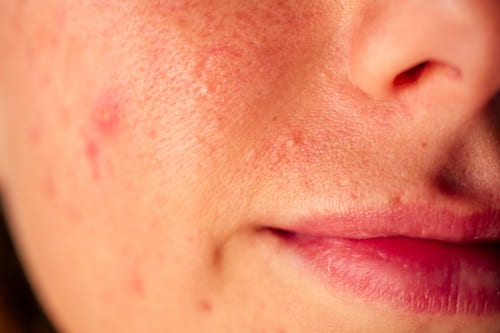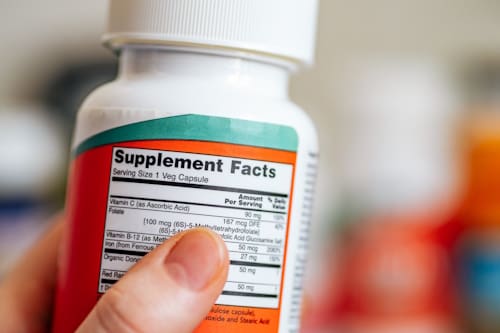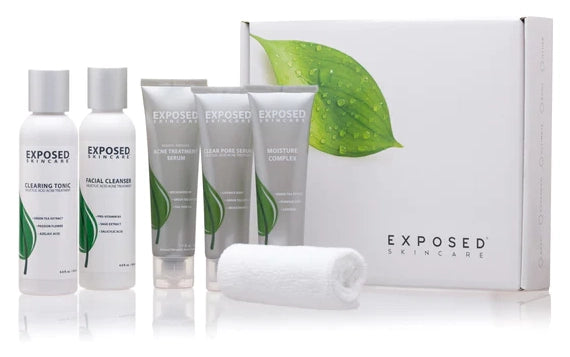Acne is a common skin condition affecting millions worldwide. While we often attribute acne to hormonal changes, stress, or improper skin care, there is another factor that doesn’t always get the limelight: vitamin deficiencies.
Recent studies have started to unveil the intricate ties between acne and deficiencies in certain vitamins. This guide sheds light on the connection between acne and vitamin deficiencies, highlighting the essential nutrients that might impact your skin health.
Also read: How to choose the best acne treatment
Biggest Take-Aways:
- Acne is influenced by various factors, with vitamin deficiencies being a significant contributor.
- Essential vitamins, especially A and E, are pivotal in skin health and acne management.
- A holistic understanding of acne requires understanding the response and pathophysiologic mechanisms.
- Exposed Skin Care provides a comprehensive solution, targeting the underlying causes and offering essential nutrients for skin health.

Acne: More than Just a Pimple
For those who think acne is just an occasional pimple, it's essential to understand that acne is a complex skin condition. It can range from mild to moderate acne to severe forms, including inflammatory acne.
The development of acne involves a mix of genetic, environmental, and dietary factors. Among these, the role that vitamin deficiencies play in acne's pathophysiologic mechanisms is becoming increasingly evident.
Acne Vitamin Deficiency: Unmasking the Key Players
Vitamin A and Acne
Vitamin A plays a pivotal role in skin health. A deficiency in this vitamin can lead to conditions like dermatitis and, importantly, acne vulgaris. Vitamin A, often used topically as a retinoid, has been a mainstay in treating acne.
When our body lacks this essential nutrient, the skin may not shed its dead cells efficiently, leading to acne breakouts.
It's also worth noting that studies have shown that acne patients often have lower levels of vitamin A in their system. This might explain why topical and oral vitamin A treatments can help acne.
The B Vitamin Connection
Acne and vitamin B share a complex relationship. Among the eight B vitamins, vitamins B12 and B7 (biotin) are often under the spotlight. An overload of vitamin B12, commonly found in animal products, might exacerbate acne in some individuals.
On the other hand, a biotin deficiency can also cause acne-like symptoms. This duality links B vitamins and acne is intricate and fascinating.
The Role of Vitamin D in Skin Health
Low vitamin D levels in patients have been associated with acne severity. Vitamin D plays an essential part in reducing inflammation within the body.
A deficiency might not only exacerbate acne but also contribute to other inflammatory skin conditions like atopic dermatitis and psoriasis.

Vitamin E: The Skin Guardian
Vitamin E, coupled with vitamin A, plays a crucial role in ensuring our skin's protective barrier remains intact. Those with acne often have reduced levels of vitamin E, which can influence the severity of acne vulgaris.
Topical applications containing vitamin E can help treat acne by combating inflammation and protecting the skin from oxidative stress.
Zinc: The Unsung Hero in Acne Management
Beyond vitamins, minerals like zinc have a significant part in skin health. An overwhelming number of patients with acne have been found to have lower levels of zinc. This mineral has anti-inflammatory properties, making it a potential acne treatment.
Studies, including randomized controlled trials, have shown that both oral and topical zinc can be an effective treatment for inflammatory acne.
Interestingly, the clinical effects of zinc as a topical or oral agent have shown promising results, especially when combined with other agents like benzoyl peroxide.
Factors that Influence Acne Vitamin Deficiency
While the direct link between acne vitamin deficiency and the skin condition is evident, it's essential to understand the underlying causes.
Diet and Acne
A diet rich in processed foods and lacking essential nutrients can lead to common nutrient deficiencies. Vitamins A and E, primarily found in whole foods, might be lacking in those who opt for processed foods. To make your skin flourish, it's crucial to include foods rich in these vital vitamins and zinc.

Hormonal Changes and Their Impact
Hormonal changes, especially in teenagers and women, can significantly impact acne's severity. These changes can indirectly affect how vitamins and minerals play in the body, especially regarding oil production and inflammation.
Gut Health and Skin Condition
It's been suggested that a true vitamin deficiency might arise from poor gut health. The absorption of essential nutrients is pivotal in determining their levels within the body. An unhealthy gut might impede the absorption of vitamins like B12, impacting skin health.
Natural Ways to Address Acne Vitamin Deficiency
Eating a Balanced Diet
To address acne vitamin deficiency, one must start with one's plate. Incorporating foods rich in vitamins A, D, E, and zinc may not only help prevent acne but also improve overall skin health.
Supplementing Wisely
While it's always best to get your vitamins from natural food sources, supplements can be a good backup. Oral vitamin supplements can be beneficial for those who have severe deficiencies. However, it's essential to note that excessive intake, especially of vitamins A and E, can have adverse effects.

Topical Treatments
Topical agents, such as retinoid (a derivative of vitamin A) or topical tea tree oil, can help treat acne by addressing inflammation and bacteria. Moreover, products that contain vitamin E can aid in reducing inflammation and promoting skin health.
The Complex Interplay: Acne, Vitamins, and Beyond
While acne vitamin deficiency is a growing field of interest, it's clear that acne's etiology is multifaceted. Factors like hormonal changes, genetics, and body mass index can influence acne's onset and severity. Understanding how vitamins and minerals interplay with these factors can offer a more holistic approach to acne treatment.
Benefits of Using Exposed Skin Care in Acne Management
Acne affects a vast number of individuals worldwide. People with acne often grapple with the underlying causes and treatments. Exposed Skin Care offers everything you need to manage acne effectively.
Some key benefits of Exposed Skin Care include:
- Targeting Multiple Causes: While many factors can cause acne, from clogged pores to excess sebum, Exposed Skin Care products address multiple causes of acne.
- Support for Severe Cases: For those with severe acne, especially lesions or inflammatory types, our Treatment Serum offers effective treatment of inflammatory acne.
- Holistic Approach: Exposed Skin Care understands the intricate response and pathophysiologic mechanisms and provides a holistic approach to ensure you're not exacerbating your skin condition.
By using Exposed Skin Care products consistently, you can ensure that your skin receives the essential nutrients it needs to stay healthy, moisturized, and free from acne.
Conclusion
Acne affects many. Various factors cause it, ranging from hormonal imbalances to vitamin deficiencies. For some, the severe acne manifestations can be tied to a deficiency in essential vitamins like vitamin A.
These deficiencies not only contribute to acne but may also exacerbate existing conditions, creating lesions and inflammatory responses. A deeper dive reveals the essential roles serum vitamins A and E play in maintaining skin health.
Those who've heard of vitamin supplements worsening acne or wonder if zinc intake could make a difference should know that every vitamin plays a vital role in our skin's health. Grasping the response and pathophysiologic mechanisms of acne is crucial.
Ultimately, for those searching for holistic solutions, Exposed Skin Care offers everything you need to know and more, providing products that consider the complex interplay of factors impacting those with acne.
FAQs
What are the primary causes of acne?
Many factors can cause acne, from hormonal imbalances to vitamin deficiencies such as vitamin A.
Can severe acne be tied to vitamin deficiency?
Yes, especially vitamin A deficiency, which can contribute to more severe acne manifestations.
How do serum vitamins A and E affect skin health?
Both serum vitamins A and E play crucial roles in maintaining skin health and can be influential in the treatment and prevention of acne.
Do certain vitamin supplements worsen acne?
Some people have reported that certain vitamin supplements, like vitamin D, can exacerbate acne, but it varies from individual to individual.
How can Exposed Skin Care help in managing acne?
Exposed Skin Care offers a holistic approach, targeting multiple pathophysiologic mechanisms of acne and ensuring the skin gets essential nutrients.



















